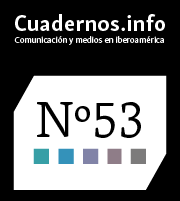El perfil del profesional de las relaciones públicas en España: situación y tendencias del sector
DOI:
https://doi.org/10.7764/cdi.53.43279Palabras clave:
relaciones públicas, tendencias, competencias blandas, competencias duras, medios de comunicación, EspañaResumen
El objetivo principal de este trabajo es aproximarse al sector de las relaciones públicas en España a través de sus profesionales. Se condujo un análisis cualitativo Delphi entre expertos y un estudio cuantitativo en Qualtrics orientado a estos profesionales. Los resultados determinan fortalezas –como el impulso del sector gracias a la diversificación, la gestión de influencers y la generación de contenidos de valor conseguidas por la transformación digital– y detallan también amenazas generadas por esa disrupción tecnológica donde el sector cambia a gran velocidad, lo que puede suponer una pérdida de confianza en el contenido que generan en los medios por la desinformación y las fake news. Los resultados podrán guiar la toma decisiones empresariales en comunicación en materia de gestión de personas, a la vez que muestran las necesidades formativas específicas de profesionales y estudiantes. La principal conclusión consiste en la exigencia de un equilibrio entre las habilidades blandas -soft- y duras -hard-: las primeras, transversales y que mantendrán su importancia en el tiempo; las segundas exigen a los profesionales una actualización continúa en aspectos técnicos.
Descargas
Citas
Aced, C. (2018). Relaciones públicas 2.0. Cómo gestionar la comunicación corporativa en el entorno digital (Public Relations 2.0. How to manage corporate communication in the digital environment). UOC.
Almansa-Martínez, A. & Fernández-Souto, A. B. (2020). Professional Public Relations (PR) trends and challenges. Profesional De La Información, 29(3). https://doi.org/10.3145/epi.2020.may.03
Álvarez-Flores, E. P., Núñez-Gómez, P., & Olivares-Santamarina, J.P. (2018). Perfiles profesionales y salidas laborales para graduados en Publicidad y Relaciones públicas: de la especialización a la hibridación (Professional profiles and work market access for graduates in Advertising and Public relations: From specialization to hybridization). Profesional De La Información, 27(1), 136-147. https://doi.org/10.3145/epi.2018.ene.13
Agencia Nacional de Evaluación de la Calidad y Acreditación. (2005). Libro Blanco Títulos de Grado en Comunicación (White Paper on Undergraduate Degrees in Communication). http://www.aneca.es/var/media/150336/libroblanco_comunicacion_def.pdf
Astigarraga, E. (2008). El método Delphi (Delphi method). Universidad de Deusto.
Brunner, B. R., Zarkin, K., & Yates, B. L. (2018). What Do Employers Want? What Should Faculty Teach? A Content Analysis of Entry-Level Employment Ads in Public Relations. Journal of Public Relations Education, 4(2), 21-50. https://aejmc.us/jpre/2018/08/17/what-do-employers-want-what-should-faculty-teach-a-content-analysis-of-entry-level-employment-ads-in-public-relations/
Civil i Serra, M. (2018). Los estudios universitarios de comunicación en España (2017). Análisis de la situación actual para un debate abierto sobre su futuro estratégico (University communication studies in Spain (2017). Analysis of the current situation for an open debate on its strategic future). In I. Postigo & M. J. Recoder (Coords.), Los y las «tics» en los estudios de comunicación (ICTs in communication studies) (pp. 15-84). ATIC.
Etike, S. (2021). Digital Transformation in Public Relations: Horizons and Frontiers. In E. Esiyok (Ed.), Handbook of Research on New Media Applications in Public Relations and Advertising (pp. 234-247). IGI Global.
García Valdés, M. & Suárez Marín, D. (2013). El método Delphi para la consulta a expertos en la investigación científica (Delphi method for the expert consultation in the scientific research). Revista Cubana de Salud Pública, 39(2), 253-267. http://www.revsaludpublica.sld.cu/index.php/spu/article/view/124
García-Nieto, M.T., Viñarás-Abad, M., & Cabezuelo-Lorenzo, F. (2020). Medio siglo de evolución del concepto de Relaciones Públicas (1970-2020). Artículo de revisión (Half a century in the evolution of theConcept of public relations (1970-2020). Review article). Profesional De La Información, 29(3). https://doi.org/10.3145/epi.2020.may.19
Helmer Hirschberg, O. (1966). The Use of the Delphi Technique in Problems of Educational Innovations. RAND Corporation. https://www.rand.org/pubs/papers/P3499.html
Krishna, A., Wright, D. K., & Kotcher, R. L. (2020). Curriculum Rebuilding in Public Relations: Understanding what Early Career, Mid-Career, and Senior PR/Communications Professionals Expect from PR Graduates. Journal of Public Relations Education, 6(1), 33-57. https://aejmc.us/jpre/wp-content/uploads/sites/25/2020/01/JPRE-6.1-full-issue.pdf#page=39
Meganck, S., Smith, J., & Guidry, J. P. (2020). The skills required for entry-level public relations: An analysis of skills required in 1,000 PR job ads. Public Relations Review, 46(5), 101973. https://doi.org/10.1016/j.pubrev.2020.101973
Meng, J. & Berger, B. K. (2019). The impact of organizational culture and leadership performance on PR professionals’ job satisfaction: Testing the joint mediating effects of engagement and trust. Public Relations Review, 45(1), 64-75. https://doi.org/10.1016/j.pubrev.2018.11.002
Morato, J., Sánchez-Cuadrado, S., & Fernández-Bajón, M.T. (2016). Tendencias en el perfil tecnológico del profesional de la información (Trends in the technological profile of information professionals). Profesional De La Información, 25(2), 169-178. https://doi.org/10.3145/epi.2016.mar.03
Moreno, D. (2019, January 4). La consultora de comunicación y RR.PP. avanza como actor de referencia ante el anunciante (The communication and PR consultancy advances as an actor of reference for the advertiser). El Publicista. https://www.elpublicista.es/reportajes/consultora-comunicacion-rr-pp-avanza-como-actor-referencia-ante
Neill, M. S. (2021). Public Relations Professionals Identify Ethical Issues, Essential Competencies and Deficiencies. Journal of Media Ethics, 36(1), 51-67. https://doi.org/10.1080/23736992.2020.1846539
Romero Quintero, E. (2011). La perspectiva de género en las Relaciones Públicas empresariales: estudio comparativo de la presencia de mujeres empresarias en prensa (Gender perspective on corporate Public Relations: a comparative study of the presence of women entrepreneurs in press). Revista Internacional de Relaciones Públicas, 1(2), 221-236. http://revistarelacionespublicas.uma.es/index.php/revrrpp/article/view/35
Theaker, A. (Ed.). (2020). The Public Relations Handbook. Routledge.
van der Meer, T. G., Verhoeven, P., Beentjes, H. W., & Vliegenthart, R. (2017). Communication in times of crisis: The stakeholder relationship under pressure. Public Relations Review, 43(2), 426-440. https://doi.org/10.1016/j.pubrev.2017.02.005
Vujnovic, M., Kruckeberg, D., & Starck, K. (2021). Extending the boundaries of public relations through community-building and organic theories. In C. Valentini (Ed.), Public Relations (pp. 433-450). https://doi.org/10.1515/9783110554250
Xifra, J. (2020). Comunicación corporativa, relaciones públicas y gestión del riesgo reputacional en tiempos del Covid-19 (Corporate communication, public relations and reputational risk management in the days of Covid-19). Profesional De La Información, 29(2). https://doi.org/10.3145/epi.2020.mar.20
Descargas
Publicado
Cómo citar
Número
Sección
Licencia
Derechos de autor 2022 Andrés Del Toro-Acosta, Purificación Alcaide-Pulido, Javier Lozano Delmar, José Antonio Muñiz-Velázquez, Alejandro Tapia Frade

Esta obra está bajo una licencia internacional Creative Commons Atribución-NoComercial-CompartirIgual 4.0.















